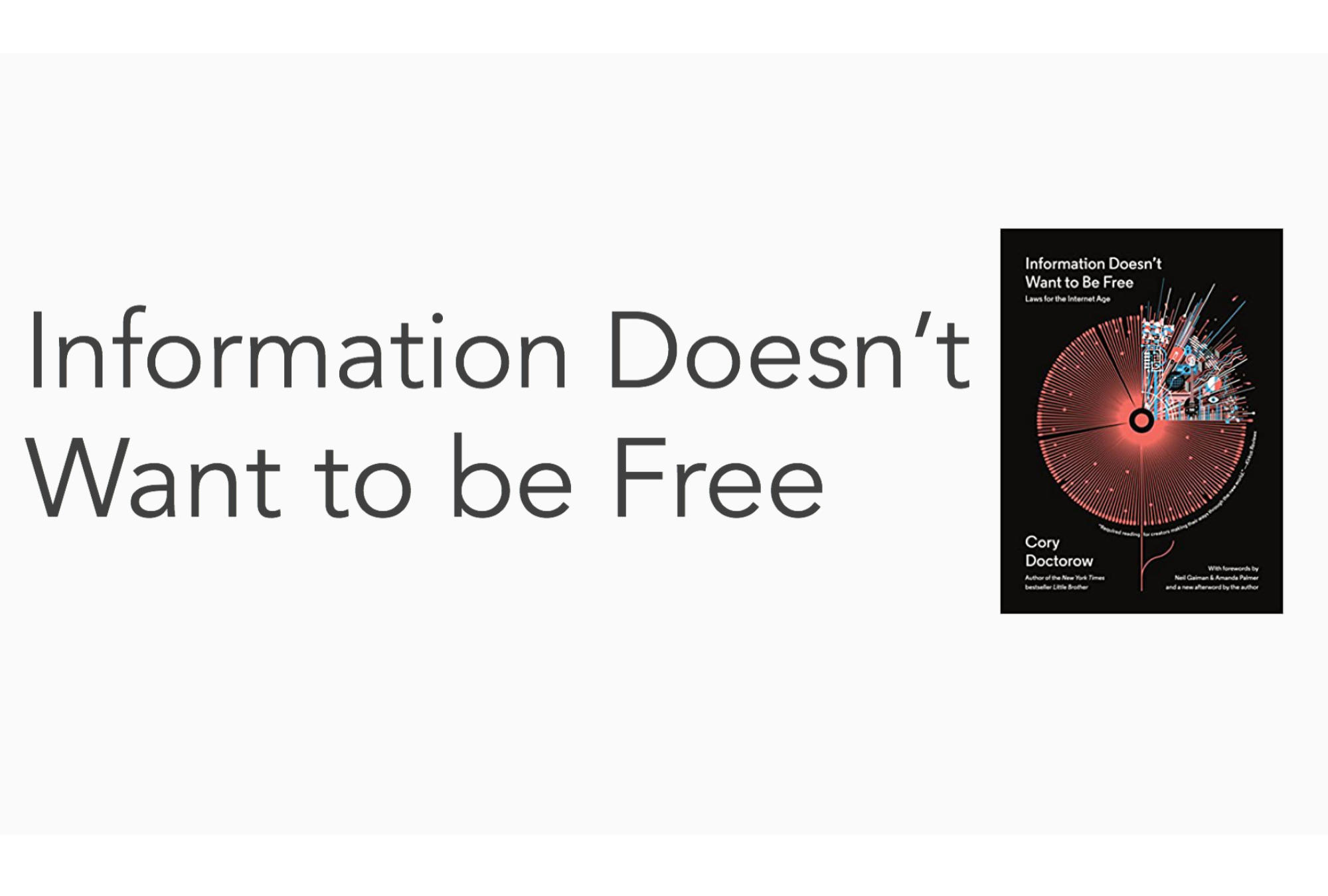There is a famous line that says information wants to be free, but Cory Doctrow would disagree with that statement. In fact the title of his book, Information Doesn’t Want to Be Free, clearly contradicts this statement.
The purpose of Doctrow’s book is to show users how to make money in the current internet system[^1]. He attempts to provide a look at the pitfalls and opportunities available to creative professionals today[^2].
## Information does want freedom
Despite saying that information doesn’t want to be free, what Doctrow actually means is that people will pay for information. Yet, he is strongly against DRM and any type of digital locks because information does want it’s freedom and creators want to keep as much freedom for their information as possible.
> If I’m your audience, and I’ve spent a thousand bucks on my movie library, I don’t want to have to throw away that investment. I want to be able to use one family of devices and one program to manage my movies. [^3]
I’ve stopped purchasing movies from Apple for the reason above. I could have my credit card default on a payment for some app from the AppStore. Apple won’t let me watch movies I’ve previously paid for until I fix this issue. It doesn’t matter that I’ve already spent money and just want to watch a movie, I can’t do that unless I fix the payment issue on something unreleased to the video.
Now I purchase and rip BluRay and DVD instead and never have to worry about this stupid digital lock again.
> Digital locks are roach motels: copyrighted works check in, but they don’t check out. Creators and investors lose control of their business—they become commodity suppliers for a distribution channel that calls all the shots. Anti-circumvention isn’t copyright protection: it’s middleman protection.[^4]
For the author that thinks they need digital locks to keep their precious material from being accessed without cost Doctrow provides an excellent quote from Tim O’Reilly.
> “Obscurity is a far greater threat to authors and creative artists than piracy” – Tim O’Reilly[^5]
Worry about people knowing who on earth you are more than a few people getting your book or music without paying. The truth is, people don’t want to “steal” content or media. They’ll happily pay for it, until you throw barriers to usage in their way. Doctrow cites a study that showed piracy of American TV shows dropping to almost non-existence as soon as purchase was made available in Europe[^6].
One of the final big issues Doctrow sees with creators having freedom is a lack of competition in platforms for distribution. The fewer channels you have to get your material out, the less control creators have[^7].
We see this in action with Apple dictating AppStore rules and many developers being unwilling to express their dislike of the relationship because they fear retribution. YouTuber’s feel locked out of YouTube and at the mercy of some faceless organization, until they get big enough for YouTube to notice them and care about what happens to an individual creator.
This is how users hold creators hostage. Make a few copyright complaints about a channel, and it gets pulled down. Doesn’t matter if the complaints are spurious, YouTube doesn’t care. There are many other creators doing something similar to step in.
## Should You Read Information Doesn’t Want to Be Free?
If you want an interesting perspective on why any form of DRM is actually bad for an individual creator, while being great for the platform due to lock in, then yes this is a great book to read. I wouldn’t say that it’s a must read for everyone, but it’s still interesting.
Purchase Information Doesn’t Want to Be Free: [Independent Bookstore](https://bookshop.org/a/11916/9781940450469) | [Amazon](https://amzn.to/3cqOhWb)
[^1]: LOC 290
[^2]: LOC 384
[^3]: Loc 508
[^4]: LOC 523
[^5]: LOC 934
[^6]: LOC 865
[^7]: LOC 1688
